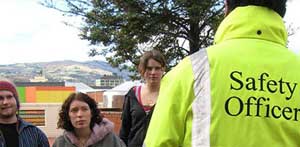Health and Safety Officer
Tasks & duties

Health and safety officers may do some or all of the following:
-
ensure that businesses comply with health and safety legislation in the workplace
-
work with staff to manage, monitor and improve health and safety standards in their workplaces
-
undertake workplace safety inspections such as monitoring noise levels in a factory
-
ensure that health and safety requirements are met before and when workplace alterations are made or new equipment is installed
-
educate and inform staff and managers on how to identify safety risks and set up preventative measures
-
help design health and safety monitoring systems and policies
-
check the efficiency of health and safety management systems and policies
-
develop emergency procedures (earthquake/fire) and co-ordinate emergency teams
-
provide emergency training (earthquake/fire)
-
educate staff about safety aspects in working from heights or confined spaces
-
assist in the rehabilitation of staff who have been injured or ill
-
facilitate regular health and safety checks for staff, and give first aid to staff when accidents occur
-
organise staff training in first aid
-
give counselling and advice, or refer people to other health professionals
In some businesses it is now common practice to employ health and safety officers whose main responsibility is to develop workplace safety systems, policies and processes.
Specific occupational nursing requirements (for example, eyesight and hearing tests and workstation assessments) may be contracted out to other health and safety service providers
Skills & knowledge

Health and safety officers need to have:
-
knowledge of health and safety legislation
-
knowledge of work-related illnesses and injuries, and rehabilitation strategies
-
knowledge of safety measures and equipment
-
knowledge of Accident Compensation Corporation (ACC) procedures and how an organisation becomes ACC-accredited
-
good communication and listening skills
-
observational skills
-
good problem-solving and decision-making ability
Entry requirements
To become a health and safety officer you need to have a tertiary qualification in occupational health/hygiene or health and safety management.
Secondary education
Sixth Form Certificate, Bursary or NCEA equivalent is recommended to enter tertiary training. Useful subjects include maths and science.
Training on the job
Some skills are gained on the job. Health and safety officers who belong to the NZ Occupational Health Nurses' Association are required to regularly attend courses to update their skills and knowledge. Health and safety officers are encouraged to belong to a professional body, such as the NZ Institute of Safety Management or the NZ Safety Council.
Useful experience
Useful experience includes a background in occupational health nursing, Accident Compensation Corporation work or work as a Department of Labour Occupational Safety and Health Inspector. A trade or technical background in engineering, plumbing or electrical work may also be useful.
Related courses
Occupational Health and Safety
For more information, please refer to Career Services.
Document Actions
